The beginning of the rainy season provides a much-needed respite from the intense summer temperatures, transforming the surroundings into a vibrant display of luscious foliage and invigorating precipitation. Nevertheless, this time of year presents its own unique difficulties, including moisture, unpredictable temperatures, and a heightened vulnerability to infections and stomach problems. It is essential to be mindful of our dietary choices during this period as our bodies require additional care and nutrients.
Consuming seasonal fruits is an excellent method to maintain good health during the rainy season. These fruits are not only plentiful during this season but also serve as nature’s means of supplying us with the essential nutrients to counteract the specific health difficulties posed by monsoon weather. Abundant in vitamins, minerals, and antioxidants, fruits that are available during the rainy season can enhance your immune system, promote better digestion, and maintain a radiant complexion even in humid conditions.
This article will guide you through the ten most recommended fruits to include in your diet during the rainy season. If you want to strengthen your immune system, enjoy tasty flavors, or make healthier dietary choices, these fruits are the best options for staying lively and energized throughout the monsoon season. Let us explore the assortment of fruits that are most enjoyable during the rainy season.
5 Rainy Season Fruits
Plum: A rainy season delight
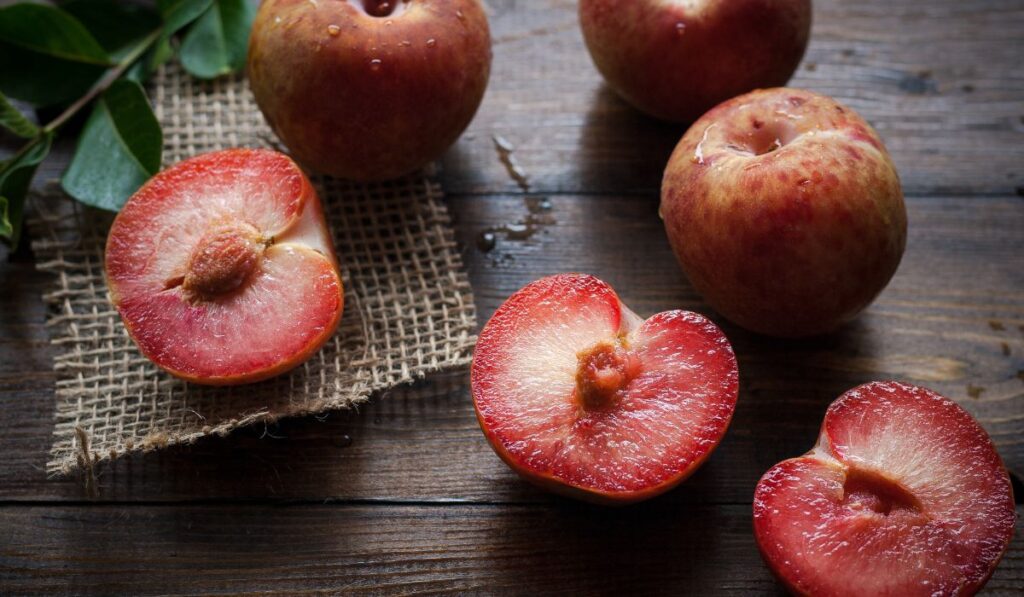
Plums are small, spherical fruits that are highly valued for their sweet and slightly tart taste. During the rainy season, plums become a frequent occurrence in markets, providing a refreshing blast of flavor that matches the cool and damp weather of the season. Plums, with their vibrant purple or scarlet skin and luscious golden flesh, are not only delectable but also rich in nutrients that can contribute to your well-being throughout the rainy season. Renowned for their adaptability, plums can be savored in their fresh state, dehydrated into prunes, or incorporated into a multitude of recipes, rendering them an essential fruit to include in your diet throughout the rainy season.
Here are some of the main health benefits of plums during the rainy season:
Antioxidant Properties
Plums have a high amount of antioxidants, particularly polyphenols such as anthocyanins, which are responsible for their dark coloration. Research indicates that plums possess a higher concentration of antioxidants compared to several other fruits such as peaches and nectarines. Plums include antioxidants that safeguard cells against harm caused by free radicals and potentially alleviate inflammation.
Digestive Health
Plums and prunes have a high fiber content, which aids in facilitating regular bowel movements and preventing constipation. Plums include fiber that aids in slowing down the absorption of sugars, potentially assisting in the regulation of blood sugar levels.
Heart Health
Plums are a rich source of potassium, a mineral that plays a crucial role in the regulation of blood pressure. Plums include antioxidants and fiber, which can potentially decrease cholesterol levels and inflammation, hence reducing the likelihood of developing heart disease. A study discovered that consuming prune juice on a regular basis was effective in reducing LDL (bad) cholesterol levels.
Bone Health
Prunes have been found to potentially mitigate bone loss and maintain bone density, although further research is required to confirm these findings. Plums include antioxidants and minerals that can potentially enhance bone health.
Blood Sugar Regulation
Plums contain polyphenols, such as chlorogenic acid, which have the potential to regulate blood sugar levels. The presence of fiber in plums contributes to the deceleration of sugar absorption. Consuming plums can aid in weight management due to their low-calorie content and high fiber content, which promotes satiety.
Additional potential advantages encompass enhancing cognitive function, alleviating anxiety, and supplying essential nutrients such as vitamin C, vitamin K, calcium, and magnesium. In general, plums are a nourishing fruit that can be a beneficial inclusion in most dietary plans when consumed in moderation as part of a well-balanced diet.
Citations:
[1] https://www.healthline.com/nutrition/benefits-of-plums-prunes
[2] https://www.webmd.com/food-recipes/benefits-plums
[3] https://www.bbcgoodfood.com/howto/guide/health-benefits-plums
[4] https://www.medicalnewstoday.com/articles/plum-nutrition-facts
[5] https://www.beatoapp.com/blog/health-benefits-of-eating-plum/
Lychee: A Juicy Rainy Season Favorite
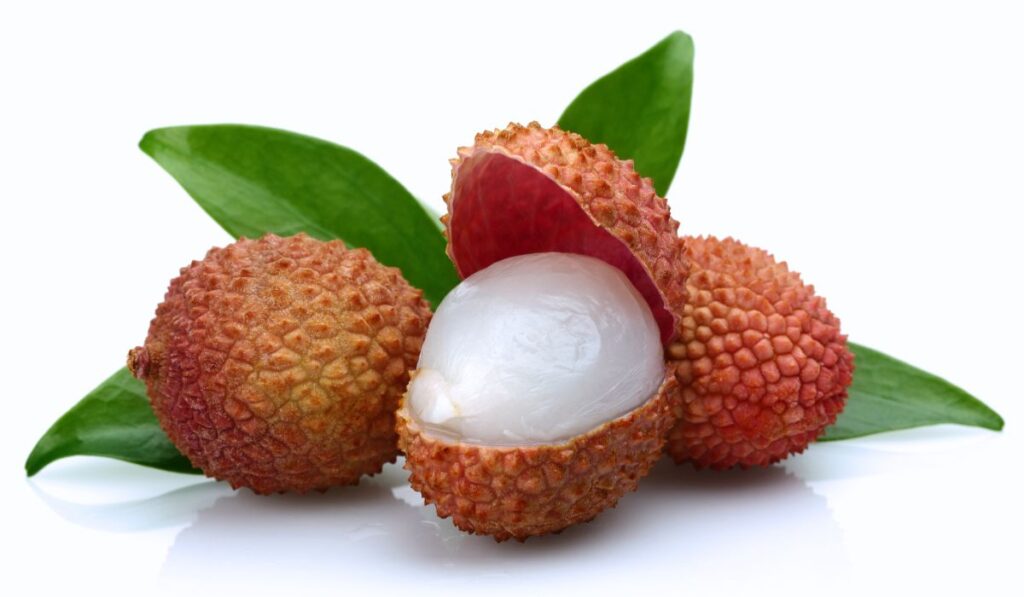
Lychee, a tropical fruit renowned for its aromatic fragrance and succulent, translucent flesh, is a genuine pleasure to indulge in during the rainy season. Wrapped in a coarse, crimson skin, this unique fruit is not only a delight for the palate but also a source of abundant nutrients. Lychee is quite popular in tropical places due to its refreshing sweetness and abundant health advantages. Lychee, being a prominent fruit during the rainy season, aids in maintaining hydration, enhancing immunity, and supplying vital nutrients that are required throughout the monsoon. Lychee is an essential fruit to include in your diet during the rainy season. It can be consumed fresh, used in desserts, or added to beverages for a refreshing taste.
Health benefits of Lychee during the rainy season:
Nutritional Benefits
Lychee is low in calories but high in essential nutrients. A 100g serving contains approximately:
- Calories: 66
- Carbohydrates: 16.5g
- Protein: 0.8g
- Fat: 0.4g
- Fiber: 1.3g
- Vitamin C: 71.5mg, which is crucial for immune function and skin health[2][3].
Cardiovascular Health
Lychee has the potential to enhance heart health by reducing blood pressure and enhancing cholesterol levels. Lychee contains phenolic chemicals that have the ability to block an enzyme responsible for regulating blood pressure, which could potentially lead to a reduction in hypertension. In addition, lychee has been shown to have the potential to reduce LDL (low-density lipoprotein) cholesterol levels and increase HDL (high-density lipoprotein) cholesterol levels.
Enhancement of the immune system
Lychee is abundant in vitamin C and antioxidants, which enhance the immune system. Research has demonstrated that it can strengthen the functioning of the immune system and improve the composition of microorganisms in the gut, which are crucial for maintaining good health.
Properties with Antioxidant Activity
Lychee contains a high concentration of antioxidants, specifically polyphenols, that aid in fighting oxidative stress and potentially lower the likelihood of developing chronic illnesses like cancer and diabetes. Antioxidants have the ability to safeguard cells from harm induced by free radicals.
Dermatological health
Lychee has a significant amount of vitamin C, which helps in the creation of collagen. Collagen is crucial for preserving the flexibility and hydration of the skin. This can result in improved skin health and a more youthful appearance, while also potentially providing protection against harmful effects of sun exposure.
Hepatic Health
Lychee has been associated with enhanced liver function. Research indicates that the polyphenols found in it may have the potential to mitigate liver damage and fatty liver disease by regulating gut bacteria and decreasing the accumulation of fat in the liver.
Prevention of Cancer
Studies suggest that lychee extracts have the potential to lower the likelihood of developing many types of cancer, such as breast, colon, and liver cancer. The putative anti-cancer effects of lychee are attributed to its antioxidants and anti-inflammatory properties.
Regulation of Blood Glucose Levels
Lychee can help regulate blood sugar levels, which is advantageous for those with diabetes. It can assist in reducing symptoms related to diabetes, such as frequent urination and excessive thirst.
Advantages for Cognitive Functioning
Several studies indicate that lychee may possess neuroprotective properties, which could potentially contribute to the prevention of neurodegenerative conditions such as Alzheimer’s disease. Lychee seed extract contains saponin chemicals that have the potential to enhance cognitive functions[1][3].
Although lychee offers several health advantages, it is crucial to take it in moderation because of its elevated sugar level. Prior to introducing lychee into their diets, individuals who are taking specific medications should get guidance from healthcare practitioners to prevent any interactions.
Citations:
[1] https://pharmeasy.in/blog/ayurveda-uses-benefits-side-effects-of-lychee/
[2] https://www.healthshots.com/healthy-eating/superfoods/lychees-benefits/
[3] https://www.medicalnewstoday.com/articles/lychee-fruit
[4] https://www.health.com/lychee-benefits-8582934
[5] https://www.carehospitals.com/blog-detail/health-benefits-of-lychee/
Jamun: A Nutrient-Rich Rainy Season Superfruit
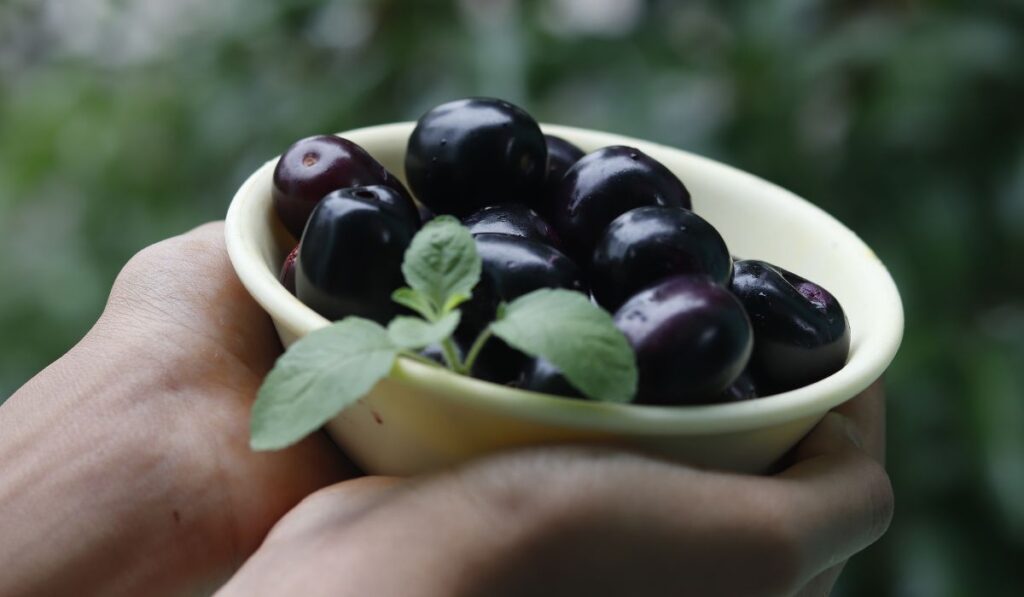
Jamun, often referred to as black plum, is a widely consumed fruit, particularly in tropical areas, especially during the rainy season. Jamun, with its rich purple color and a combination of sweet and tangy taste, is not only enjoyable but also contains vital nutrients, making it a potent inclusion in your monsoon diet. Jamun is abundant in antioxidants, vitamins, and minerals, which contribute to several health advantages, such as enhancing digestion and controlling blood sugar levels. Jamun, being one of the leading fruits to consume during the rainy season, aids in safeguarding your body against typical monsoon illnesses while improving general well-being. Jamun is an essential addition to your fruit basket during the rainy season, whether you want to consume it fresh, in juices, or as a component of traditional treatments.
Health benefits of Jamun
Regulation of Blood Glucose Levels
Jamun has certain advantages for persons who are managing diabetes. The presence of chemicals such as jamboline and jambosine in it contributes to the reduction of blood sugar levels by inhibiting the rapid conversion of starch into sugar. As a result, it is a desirable option for individuals seeking to regulate their blood glucose levels.
Digestive Health
The fruit has a significant amount of dietary fiber, which promotes healthy digestion and reduces the risk of constipation. In addition, its gentle astringent characteristics can help relieve diarrhea and other digestive problems, boosting overall gastrointestinal health.
Immune System Support
Jamun is a highly beneficial source of vitamin C and antioxidants, which effectively improve immunological function. These essential minerals enhance the body’s immune system and enhance the absorption of iron, hence promoting overall well-being.
Cardiovascular Health
Jamun is advantageous for cardiovascular health because of its high potassium content, which aids in the regulation of blood pressure. Jamun contains antioxidants that effectively decrease inflammation and oxidative stress, hence promoting cardiovascular well-being.
Skin and Hair Benefits
The presence of antioxidants and vitamins in jamun promotes the maintenance of healthy skin and hair. Frequent ingestion can enhance the flexibility of the skin, diminish imperfections, and stimulate a luminous appearance. Consuming jamun juice can effectively cleanse the body, leading to improved skin health.
Anti-inflammatory properties
Jamun possesses anti-inflammatory properties that can potentially reduce discomfort associated with illnesses such as arthritis. Frequent ingestion can decrease joint discomfort and inflammation, facilitating improved movement.
Detoxification
Due to its high water content, jamun serves as a natural detoxifier by aiding in the elimination of toxins and maintaining proper hydration in the body. This characteristic is especially advantageous during sweltering summer months.
Dietary Composition
For every 100 grams, jamun offers approximately:
- Energy content: 62 calories
- Carbohydrates: 15.5 grams
- Dietary fiber content: 1.5 grams
- The amount of Vitamin C is 18 milligrams.
- The iron content is 1.41 milligrams.
- Potassium content: 55 mg.
To summarize, including jamun in your diet can provide a variety of health advantages, making it a valuable inclusion in a well-balanced diet.
Citations:
[1] https://pharmeasy.in/blog/jamun-benefits-uses-side-effects/
[2] https://www.1mg.com/articles/purple-powerhouse-10-surprising-benefits-of-jamun-fruit/
[3] https://timesofindia.indiatimes.com/life-style/health-fitness/diet/9-health-benefits-of-consuming-jamun-in-summers/articleshow/111081916.cms
[4] https://www.youtube.com/watch?v=-ADZElXkNoQ
[5] https://pharmeasy.in/blog/jamun-juice-exploring-its-health-benefits-and-uses/
Pear: A Crisp and Hydrating Rainy Season Fruit
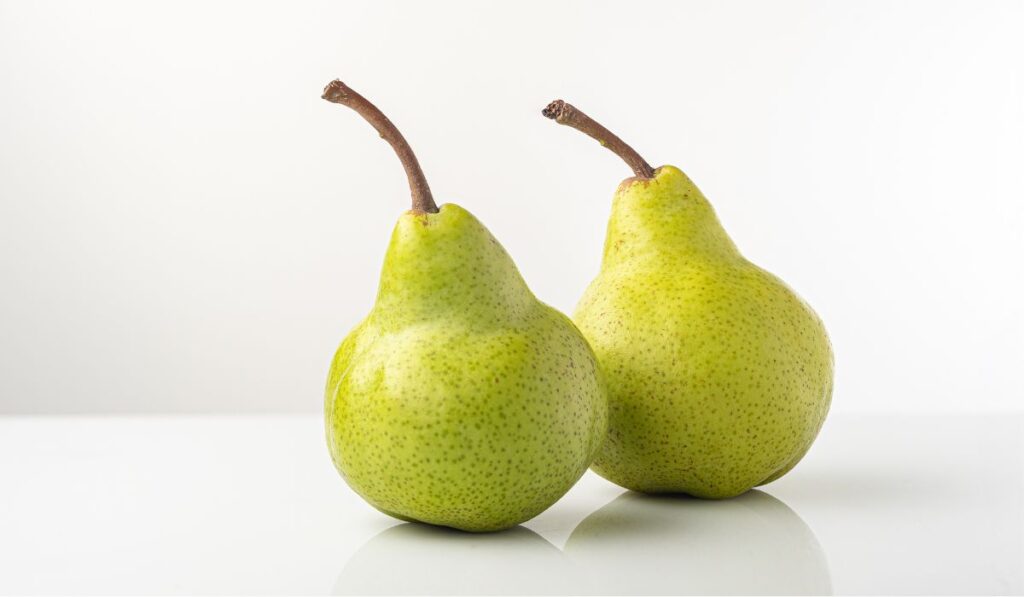
Pears, known for their juicy and slightly granular consistency, make a pleasant complement to your diet during the rainy season. This adaptable fruit is not only invigorating but also filled with vital minerals that promote overall well-being, particularly during the monsoon season. Pears are renowned for their elevated water content, plenty of fiber, and rich antioxidant content, rendering them one of the premier fruits to savor during the rainy season. Their delicate sweetness and gratifying crispness can be savored independently, included in salads, or integrated into other culinary preparations. Pears are highly beneficial during the rainy season as they effectively hydrate the body, enhance immune function, and support digestive well-being.
Health benefits of pears in the rainy season
Pears offer a variety of health benefits due to their rich nutritional profile. Here are some key advantages:
Nutritional Content
Pears are an excellent source of:
- Dietary Fiber: A medium pear contains about 6 grams of fiber, which is essential for digestive health and helps maintain steady blood sugar levels.
- Vitamins: They are high in vitamin C, which supports immune function, and vitamin K, important for bone health.
- Antioxidants: Pears contain flavonoids and carotenoids, which help combat oxidative stress and inflammation in the body.
Gastrointestinal Well-being:
Pears contain a significant amount of dietary fiber, which facilitates the process of digestion, encourages regularity in bowel movements, and serves as a preventive measure against constipation. Pectin, a type of soluble fiber, provides nourishment to the bacteria in the gut and improves gut health.
Blood Sugar Management:
Pears possess a low glycemic index, ranging from 20 to 49, which renders them an excellent choice for regulating blood sugar levels. Their high fiber content hinders the rapid absorption of sugar, hence decreasing fluctuations in blood glucose levels. Research indicates that consistent consumption of pears may reduce the likelihood of getting Type 2 diabetes.
Heart Conditions:
Pears include antioxidants and fiber, which support cardiovascular health. These substances have the potential to decrease cholesterol levels and mitigate the likelihood of heart disease and stroke. Studies have shown that consuming pears is linked to a reduced likelihood of experiencing cardiovascular events.
Anti-inflammatory properties:
Pears contain antioxidants that have the ability to decrease inflammation, a condition associated with chronic illnesses like diabetes, heart disease, and specific types of cancer. Pears contain flavonoids that are highly beneficial in reducing inflammation.
Managing one’s weight:
Pears include dietary fiber that induces satiety, so aiding in the reduction of calorie consumption and facilitating weight loss endeavors. Consuming pears, which are rich in dietary fiber, can aid with appetite regulation.
Water intake and removal of toxins:
Pears possess a substantial amount of water, which facilitates hydration and supports the body’s detoxification process by promoting regular kidney function and eliminating toxins.
To summarize, the inclusion of pears in your diet can offer a multitude of health advantages, rendering them a nourishing and delectable option for general wellness.
Citations:
[1] https://health.clevelandclinic.org/benefits-of-pears
[2] https://www.webmd.com/diabetes/pears-diabetes-benefits-risks-nutrition
[3] https://www.realsimple.com/health-benefits-of-pears-8664864
[4] https://www.health.com/pears-7568397
[5] https://www.medicalnewstoday.com/articles/285430
Custard Apple: A Creamy and Nutritious Rainy Season Fruit
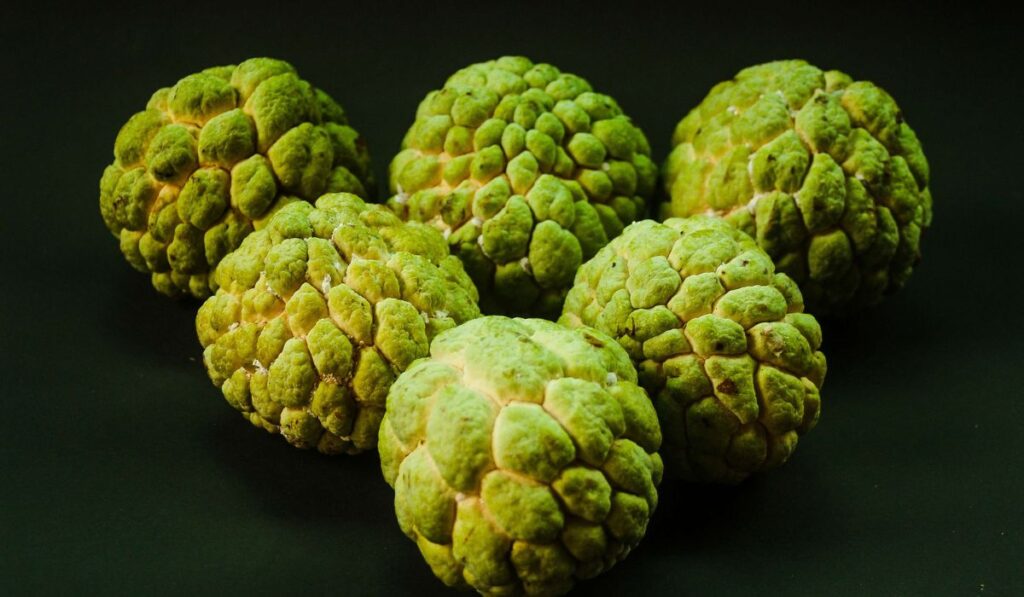
The custard apple, scientifically known as Annona reticulata, is a tropical fruit that thrives in plenty during the rainy season. The custard apple, known for its distinctively smooth texture and delightful sweetness, is not only a delectable indulgence but also a rich source of essential nutrients that can greatly enhance your well-being during the rainy season. Custard apple is abundant in vitamins, minerals, and antioxidants, which enhance immune function, facilitate digestion, and offer a natural surge of energy. Custard apple is a highly recommended fruit to incorporate into your diet during the rainy season. It not only safeguards against typical monsoon illnesses but also enhances the taste and nutritional value of your meals. Whether consumed in its raw state or incorporated into sweet dishes, this particular fruit is essential for individuals seeking to maintain good health throughout the rainy season.
Nutritional Profile:
- Custard apples are packed with essential nutrients. Per 100 grams, they contain:
- Calories: 101
- Carbohydrates: 23.6 g
- Fiber: 5.4 g
- Sugars: 19.3 g
- Protein: 2.1 g
- Fat: 0.6 g
- Vitamin C: 19.3 mg
- Potassium: 382 mg
- Magnesium: 21 mg
- Calcium: 22 mg
- Iron: 0.6 mg
Custard apple, also known as cherimoya or Sitaphal, is a nutrient-rich fruit that offers a variety of health benefits. Here are some of the key advantages associated with its consumption:
Health Benefits of Custard Apple
Promotes cardiovascular health
Custard apples are abundant in potassium, a mineral that aids in the regulation of blood pressure by inducing relaxation of blood vessel walls. The antioxidants, including vitamin C and flavonoids, provide further protection to cardiovascular health by counteracting oxidative stress.
Enhances Visual Well-being
The fruit includes lutein, a pigment that safeguards the eyes from oxidative harm and potentially lowers the likelihood of age-related macular degeneration (AMD). The presence of Vitamin A in custard apples also enhances visual acuity.
Enhances Digestive Function
Custard apples are rich in dietary fiber, which helps maintain digestive health by stimulating regular bowel motions and nourishing good gut bacteria. This can improve the process of nutrient absorption and contribute to the general health of the digestive system.
Properties of Antioxidants
Custard apples are abundant in antioxidants, which aid in the neutralization of free radicals within the body, hence potentially decreasing the likelihood of chronic illnesses such as cancer.
Effects that reduce inflammation
Custard apples contain antioxidants and other chemicals that possess anti-inflammatory characteristics, capable of mitigating symptoms associated with chronic inflammation.
Possible Anti-cancer Effects
Scientific research suggests that specific substances found in custard apples can impede the formation of cancer cells. Laboratory tests have demonstrated their potential effectiveness against several forms of cancer.
Enhances Immune Function
The elevated concentration of vitamin C enhances the immune system, aiding the body in resisting infections and diseases. May assist with weight management. Custard apples can induce satiety due to their high fiber content, potentially aiding in weight management endeavors.
Maintains Blood Glucose Homeostasis
Initial research indicates that custard apple leaves may have the ability to manage blood sugar levels and enhance insulin sensitivity, which could be advantageous for patients with diabetes.
Beneficial for Skin Health
Custard apples include vitamins and antioxidants that can help maintain youthful skin and improve complexion.
Factors to be taken into account:
Although custard apples are generally considered safe for consumption, it is important to take caution when consuming their seeds and skin. These parts of the fruit contain annonacin, a neurotoxin that can be potentially dangerous in excessive quantities. It is recommended to just ingest the edible part of the fruit.
To summarize, custard apples are both delectable and provide a multitude of health advantages, rendering them a great inclusion in a well-rounded diet.
Citations:
[1] https://www.carehospitals.com/blog-detail/benefits-of-custard-apple/
[2] https://redcliffelabs.com/myhealth/food-and-nutrition/sweet-and-healthy-the-surprising-health-benefits-of-custard-apple/
[3] https://pharmeasy.in/blog/ayurveda-uses-benefits-side-effects-of-custard-apple/
[4] https://www.webmd.com/diet/custard-apples-health-benefits
[5] https://www.custardapple.com.au/about-custard-apples/nutritional-benefits

Discover the top 5 superfoods to enjoy during the rainy season! Plums and lychees are just two of the delicious and nutritious fruits that can boost your immune system, aid digestion, and provide essential vitamins and minerals.